4Revsピックアップ
2024年3月6日
ナイジェリアのトマト産業への投資とインパクト
#インパクト投資#持続可能な食料システム#社会的企業#農業持続可能性

【概要】
西アフリカ、特に最大の経済大国であるナイジェリアにおいて、トマト産業は困難に直面している。 同国では、料理にトマトペーストを多用するが、そのほぼすべてが輸入品である。需要が高まるにつれ、ナイジェリアの農家は 換金作物としてトマトを栽培するようになったが、貯蔵、輸送、病気などの問題が立ちはだかっている。 年間収穫量が150万トンを超えるにもかかわらず、おおよそ40%が廃棄されており、インフレ、石油価格の変動、通貨切り下げが 農家の生活を脅かしている。
2014年に設立された「Tomato Jos」は、先駆的な社会的企業であり、20年1月に500万ドルのトマト加工工場を設立した。困難を 乗り越えながら、わずか1年以内に国内第3位の規模に急成長。1時間当たり3.5トンの加工が可能になり、輸入濃縮液に頼らずに ペーストを生産できるようになった。同社の製品は、1700万米ドルから2600万米ドルの企業評価額で市場に投入された。 経済的な生産性と同時に、バリューチェーンの強化も目指している。生産量を確保し、質の高い地産を促し、浪費に対処すること で、食料不安の問題に取り組んでいる。同社の垂直統合型モデルには、農家の育成、コミュニティ開発の促進、国内および国外に おけるトマト加工品の市場アクセスの強化が含まれる。農家の所得を大幅に向上させ、毎年100万米ドル以上の直接収入を地域経済 にもたらし、地域の教育や住宅指標の改善に貢献している。
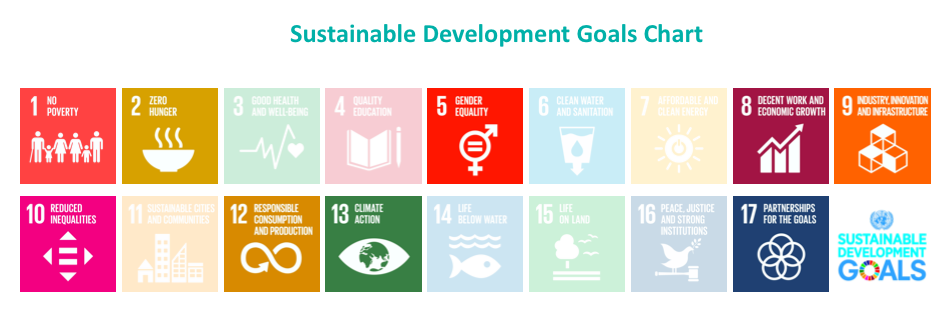
主な注目点:トマト栽培はナイジェリア全土で広く行われている。
問題:トマト栽培はナイジェリア全土に広がっており、FAOの統計によれば、主に0.5から4ヘクタールの圃場を持つ零細農家によって行われており、総生産量の90%を占めている。1.8メートルトンに達する生産量の増加にもかかわらず、年間2.4メートルトンと推定されるトマトの需要を満たすには大きな課題に直面している。不愉快なことに、40% の収穫後のトマト在庫が、ナイジェリアでは毎年大幅に失われている。 この非効率性は、より大きな問題、つまり、金融、サービス、機械、指導、教育といった重要な資源へのアクセスが限られているという国の苦闘の一因となっている。このような課題を総合すると、72%の零細農家が1日1.90ドルの貧困ライン以下で生活している。収穫不足という包括的な結果は、農家の困窮と食糧不安によってさらに深刻化し、ナイジェリアが外国からの農産物輸入に大きく依存していることを浮き彫りにしている。
背景:世界で最も急速に人口が増加し、若者の人口が最も多い国であるナイジェリアでは、70% の住民が30歳未満であり、19.61% 近い若者の失業率に直面している。アフリカ第2位、世界第14位のトマト生産国であるにもかかわらず、ナイジェリアは逆説的に世界第13位のトマトペースト輸入国となっている。10~15% の年間成長が見込まれる20万トンのトマトペーストの需要は、FMARDによると、今後5年間で毎年2.5%成長し、1億7000万人に達すると予測されるナイジェリアの膨大かつ着実に増加する人口によって煽られている。
解決策 2014年にMira Mehtaによって設立されたTomato Josは、ナイジェリアの先駆的な社会的企業であり、2020年1月に500万ドルのトマト加工工場の設立に成功した。困難を乗り越え、この工場は1年以内にナイジェリア第3位の規模に急成長し、1時間当たり3.5トンの新鮮なトマトを処理する能力を誇った。特筆すべきは、濃縮トマトを輸入せずにトマトペーストを生産していることだ。2022年半ばまでに、トマト・ジョスは500ヘクタールの企業に拡大し、2,600ヘクタール以上の土地で数千の小規模農家と協力する野心的な計画を立てた。市場への参入は、1,700万ドルから2,600万ドルの企業評価によって特徴づけられた。200人以上のフルタイムおよび契約労働者を雇用するほか、同社は3,000人以上の零細農家とネットワークを持ち、年間を通じて協働して全国平均を大幅に上回る収量を生産している。
インパクト・ステートメント:トマト・ジョスは、経済生産性と地域の富の創出を強化するだけでなく、強固なトマト・バリュー・チェーンの確立、製造処理能力の確保、質の高い地元生産の提唱、食料不安と闘うための食料浪費への対応において、極めて重要な役割を果たしている。同社の垂直統合型モデルには、地元農家の育成、コミュニティ開発の促進、ナイジェリア国内および潜在的な海外へのトマト加工品の市場アクセスの強化が含まれる。ナイジェリア北部に中産階級を作るという使命を持つトマト・ジョスは、農家の所得を大幅に向上させ、毎年100万ドル以上の直接収入を地元経済にもたらしている。さらに、同社の影響は地域の教育や住宅指標の改善にも及んでいる。
システムの視点: トマト・ジョスが進むべき道を描くとき、激しい市場競争、消費者行動の転換の必要性、サプライチェーンの混乱に伴うリスクなど、手ごわい課題に直面している。社会的インパクトを維持し、財務的な持続可能性を確保し、技術的な進歩を取り入れながら、こうした複雑な状況を乗り切ることは、ナイジェリアのトマト産業の未来を形作り続けるトマト・ジョスにとって極めて重要である。
ケースの概要
トマトは、アフリカ全土の何百万人もの人々の多様な食生活の中で中心的な位置を占めており、スープ、シチュー、ソースなど様々な料理で重要な役割を果たしている。ナイジェリアは、西アフリカの料理シーンにおいて重要な役割を担っており、特に「ジョロフ・ウォーズ」では熱烈な争奪戦が繰り広げられており、その影響力はトマト産業における課題と機会にも及んでいる。ナイジェリアの人々は料理にトマトペーストを多用しており、歴史的にナイジェリアのトマトペーストはほぼすべて輸入されていた。1971年から2020年にかけて、アフリカのトマト生産量は大幅に増加し、329万トンから2220万トンに急増した。
経済規模でも人口でもアフリカ最大の国であるナイジェリアは、サハラ以南のアフリカで第2位のトマト生産国としてリードしており、2019年の同地域の生鮮トマト生産量の10.8%を占めている。過去10年間で、ナイジェリアの生鮮トマト生産量は25%急増し、推定230万トンに達した。ナイジェリアは世界第14位、アフリカ第2位のトマト生産国であるにもかかわらず、逆説的なことに、トマトペーストの輸入量は世界第13位、アフリカ第3位である。
驚くべきことに、ナイジェリアは年間5億ドルもの予算を、ピューレ、ペースト、トマト缶を含むトマト輸入に充てている。西アフリカ最大の経済大国であるナイジェリアは、需要の増加に対応するため、特に北部地域で換金作物としてトマトを栽培している。ナイジェリアでは、収穫されたトマトの40~50%(150万トンを超える)が市場に出回らず、ポストハーベストのロスを大きくしている。
貯蔵の制限、輸送インフラの不備、病気といった課題が、トマトの入手可能性と収穫高に影響を及ぼしている。農業部門へのインフラ支援が不十分なため、70% のナイジェリア農家の仕事が危険にさらされ、小規模農家は農産物の市場を確保する手段を欠いている。輸入への歴史的な依存は、インフレの上昇、石油価格の変動、通貨切り下げと相まって、ナイジェリアの食糧安全保障と農民の収入に対する脅威を悪化させている。
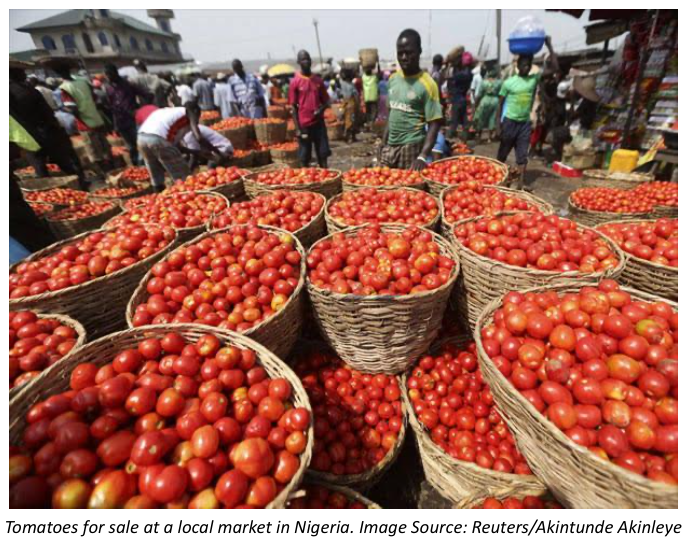 </img
</img
ナイジェリアのトマト農家「トマト・ジョス」。
こうした課題の中、ナイジェリア北部のカドゥナ州カンギミ村で、変革をもたらす取り組みが展開された。2014年にMira Mehtaによって設立されたTomato Josは、ナイジェリアを拠点とするトマトの農業と加工に特化した社会的企業である。同社は、トマトのサプライチェーンの各段階に関わる垂直統合型のビジネスモデルを確立することで、貯蔵、輸送、加工に関する問題など、ナイジェリアのトマト産業における課題を解決することを目指している。
2020年、トマト・ジョスは500万ドルのトマト加工工場を設立した。世界的大流行の数週間前に始まったこのプロジェクトは、2021年1月までにナイジェリアで3番目に大きなトマト工場となり、1時間当たり3.5トンの生鮮トマトの加工能力を誇る。特筆すべきは、濃縮トマトを輸入せずにトマトペーストを生産する国内唯一の工場であることだ。2022年半ばまでに、この工場の製品はすでに市場に浸透しており、重要なマイルストーンとなっている。
トマト・ジョスの戦略的な事業アプローチには、加工だけでなく、地元産トマトの生産開発も含まれ、事業の川上側のリスクを軽減している。工場建設に先立ち、同社は5年間にわたって地元の農家と緊密に協力し、研修、技術、農業資材を提供した。この農業関連企業の成功は、段階的なアプローチによるところが大きく、製造に投資する前に、地域で最良の農法を開発することに集中することで、上流の開発を優先させている。この戦略により、持続可能な原料パイプラインが確保され、供給リスクが最小限に抑えられ、デジタル技術と持続可能なエネルギー慣行を取り入れた、流通のための強固なインフラが確立される。工場の稼働率は80%以上を維持し、生産トン当たりコストの高騰を回避することで、最終製品の生産における収益性を確保している。
同社の戦略的アプローチには、現地の状況を深く理解することが含まれ、トマト・ジョスは業界の他のプレーヤーとは一線を画している。世界的なトレンドと現地の現実を一致させることの重要性を認識するCEOは、ナイジェリアのインフラ制約にシステムを適合させる必要性を強調している。
この基礎的な取り組みにより、トマトの品質向上、収穫量の増加、農家の収入向上がもたらされ、トマトのバリューチェーン全体の強化に貢献した。2014年の設立以来、同社は農家の平均収穫量を1ヘクタール当たり5トンから22トンに340%以上増加させる一方、平均収入を455%増加させる支援を直接行ってきたという。200人以上のフルタイムおよび契約労働者を雇用していることに加え、同社は3,000人以上の零細農家のネットワークを持っており、年間を通じて協力し合い、全国平均をかなり上回る収量を生産している。
トマト・ジョスの工場経営が意味するものは、経済的生産性にとどまらない。このベンチャーは、地域のトマト生産における課題に取り組み、農村コミュニティにおける富の創造を促進し、トマトペーストの製造処理能力を確保し、食料浪費の問題を緩和することで、食料不安と闘っている。トマト・ジョスは、アフリカで最も貧しい地域のひとつで、進歩、教育、起業を可能にし、何百人もの人々の生活に変革をもたらしました。
インパクト投資</strong
シリーズA資金調達ラウンドにおいて、トマト・ジョスは440万米ドルの投資に成功した。このラウンドは、ナイジェリアを拠点とするパートナーAlitheia Capitalと共同でGoodwell Investmentsが主導し、アメリカの投資家Acumen Capital PartnersとVestedWorldが追加出資した。調達した資金を迅速に投入し、トマト・ジョスは加工機器の購入と工場の建設に着手した。工場の稼動に伴い、同社はフルタイムの従業員数が50人から約70人に増加することを見込んでいる。さらに、トマト・ジョスは将来的に何千もの栽培農家と協力し、農家の収入機会を増やすことで年間100万米ドル以上を地元経済に注入することを想定している。
これは、比較的ささやかな協定であっても触媒として機能し、開発途上市場への民間資本流入を長期的に増加させる道を開くことができることを示している。世界で最も重大な開発課題に対処するために必要な資源と、世界中の国際開発機関やドナーの予算を合計したものとの間には、かなりの資金ギャップが存在するため、こうした資本流入は極めて重要である。これらの組織が単独でこのギャップを埋めるには限界があることを認識した上で、世界の人々の幸福を高めるためには、民間セクターの潤沢な資本から資金を集めなければならないというのが、一般的な考え方である。
これらの投資家は、単に資金を提供するだけでなく、厳しい基準や財務の持続可能性を要求する。さらに、一旦社会的企業に投資すると、投資家はその企業の成功に強い意欲を示す。大局的に見れば、このような投資は現地市場の深化、現地の能力の向上、そして各国の自立の育成に貢献する。こうした成果は、ひいては、予算が限られている国際開発機関の努力をより持続可能なものにする。
USAIDは、トマト・ジョスへの支援を通じて、プロスパー・アフリカの目的を積極的に推進し、世界で最も貧しい地域のひとつであるナイジェリア北部に数百万ドルの民間資本を誘導している。この支援は、より甘いトマトを栽培するだけでなく、雇用を創出し、所得を向上させ、食糧安全保障を強化し、教育へのアクセスを改善し、女性に力を与える企業を支援するものである。
全体として、トマト・ジョスは、ナイジェリアにおけるトマト加工というダイナミックな状況において、課題を克服し、新たな市場機会を捉え、革新的なインフラ・ソリューションを実施する上でのケーススタディとなっている。
インパクト・ステートメント
アフリカの農業セクターにおける未開発の潜在力は大きく、この地域のGDPの4分の1近くを占め、人口の3分の2の生活を支えている。世界の未耕作地の大部分を占めているにもかかわらず、アフリカは農業の非効率性とバリューチェーンの弱さによる課題に直面している。近代的な設備や技術を利用できない小規模農家が、農業セクターの大半を占めている。
トマト・ジョスは、ナイジェリア北部の農業を変革し、こうした課題に取り組む上で重要な役割を担っている。トマトの加工にとどまらず、経済的エンパワーメントと持続可能な開発のための触媒となる。トウモロコシ、大豆、トマトの加工における同社の統合的アプローチは、収量を大幅に増加させ、自給自足の農家を商業生産者に転換させた。これは大幅な収入増につながり、農家は5~6倍の収入増を経験している。
トマト・ジョスは単なる経済力ではなく、社会変革の原動力なのだ。農業のベストプラクティス、革新的なモデル農場、アウトグロワー・プログラムに注力することで、同社は地域の教育や住居の指標を改善した。かつては貧困に直面していた農家も、今では事業に投資して農場を拡大し、地域の中産階級の形成に貢献している。
地元への影響に加えて、トマト・ジョスは官民協力の成功例を示している。USAIDの支援を受け、プロスパー・アフリカ・イニシアティブと連携している同社は、シリーズAラウンドで重要な資金を獲得し、その使命が世界的に認められたことを示している。ナイジェリアで3番目に大きなトマト加工施設であるトマト・ジョスは、現地調達、地域開発、環境の持続可能性を重視し、倫理的なビジネス慣行の模範となっている。
トマト・ジョスは、以下のような国連の持続可能な開発目標(SDGs)に取り組んでいる:
SDGs1:貧困ゼロ SDG1:貧困ゼロ:トマト・ジョスは零細農家に力を与え、収入増と生活向上の機会を提供することで貧困から脱却させる。
SDG2: 飢餓ゼロ: 農業慣行の改善、収穫量の向上、ポストハーベストロスの削減により、トマト・ジョスは食料安全保障に貢献し、飢餓撲滅の取り組みを支援します。
SDG5:ジェンダー平等: 同社の取り組みには、女性農家との協働、ジェンダーを包含した実践の推進、農業分野における女性のエンパワーメントへの貢献が含まれる。
SDG8:ディーセント・ワークと経済成長: トマト・ジョスは、特に農村部において雇用機会を創出し、経済成長を促し、地域の中間層の育成に貢献しています。
SDG9: 産業、イノベーション、インフラストラクチャー: 完全統合型加工事業としてのトマト・ジョスの設立は、農業分野における革新的なモデルであり、産業の成長とインフラ整備に貢献する。
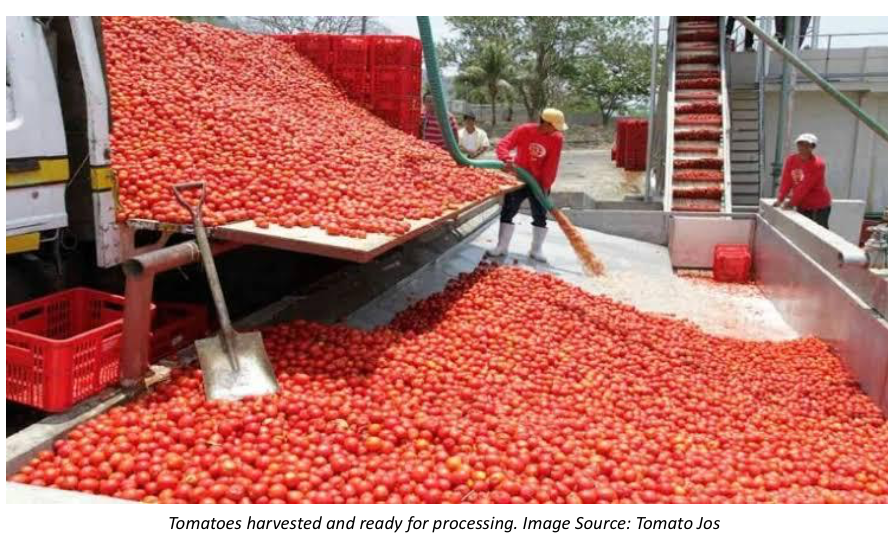 SDG10:不平等の削減: 小規模農家や女性農家を含む多様な農家と協力するトマト・ジョスの取り組みは、農業バリューチェーンにおける不平等の削減に貢献している。
SDG10:不平等の削減: 小規模農家や女性農家を含む多様な農家と協力するトマト・ジョスの取り組みは、農業バリューチェーンにおける不平等の削減に貢献している。
SDG12:責任ある消費と生産: 責任ある生産、廃棄物の削減、資源の効率的な利用など、持続可能な農業の実践を推進しています。
SDG13:気候変動対策: 持続可能な農業へのコミットメントは、環境にやさしい農法を推進することで、気候変動対策の目標に合致しています。
SDG17:目標のためのパートナーシップ: USAID、民間投資家、地域社会との協力は、持続可能な開発目標を達成するためのパートナーシップの重要性を示している。
システムの視点
トマト・ジョスは、称賛に値する成功を収めつつも、今後の方向性を描くにあたり、いくつかの課題と考察に直面している。多額の広告予算を持つ多国籍企業が支配する、競争の激しいトマトペースト市場では、市場シェアを維持し、継続的な成長を達成することが、継続的な課題となっている。同社のターゲット層は若い消費者に集中しており、ブランドの嗜好を徐々に変化させることを目指しているが、消費者行動、特に既存のブランドに忠実な年配世代の消費者行動の変化は、依然として緩やかなプロセスである。
トマト・ジョスの成功は、トマトのサプライチェーンの信頼性と品質と密接に結びついている。天候に関する問題や作物に影響を及ぼす病気など、いかなる混乱も生産と収益性に影響を及ぼす可能性がある。ナイジェリアの市場では、効率的で広範な流通チャネルが最も重要であり、戦略的パートナーシップと物流の効率性が求められる。資金調達ラウンドの成功やUSAIDの支援にもかかわらず、同社は外部資金に依存しているため、財務の持続可能性に焦点を当て、自立の道を探る必要がある。
ナイジェリアの景気変動、規制の変更、通貨切り下げなどの外的要因は、事業環境に大きな影響を与える可能性がある。長期的な安定のためには、こうした外的要因への対応が不可欠である。さらに、ナイジェリアの農業部門におけるインフラや物流に関する課題は、農場から加工施設までトマトをタイムリーかつ効率的に輸送し、ポストハーベスト・ロスを最小限に抑えるために対処する必要がある。
トマト・ジョスはコミュニティ・プロジェクトに取り組んでいるが、社会的インパクトを維持するには継続的な努力が必要である。ビジネスの目標と地域社会の発展のバランスをとり、農家と地域社会に公平な利益を確保することは、継続的な検討事項である。農業と加工における技術の進歩を取り入れることは、効率性、生産性、競争力を高めるために不可欠である。会社が拡大するにつれて、農業と加工において持続可能で環境に優しい慣行を取り入れることは、長期的な生態系の懸念に対処するための優先事項であるべきだ。
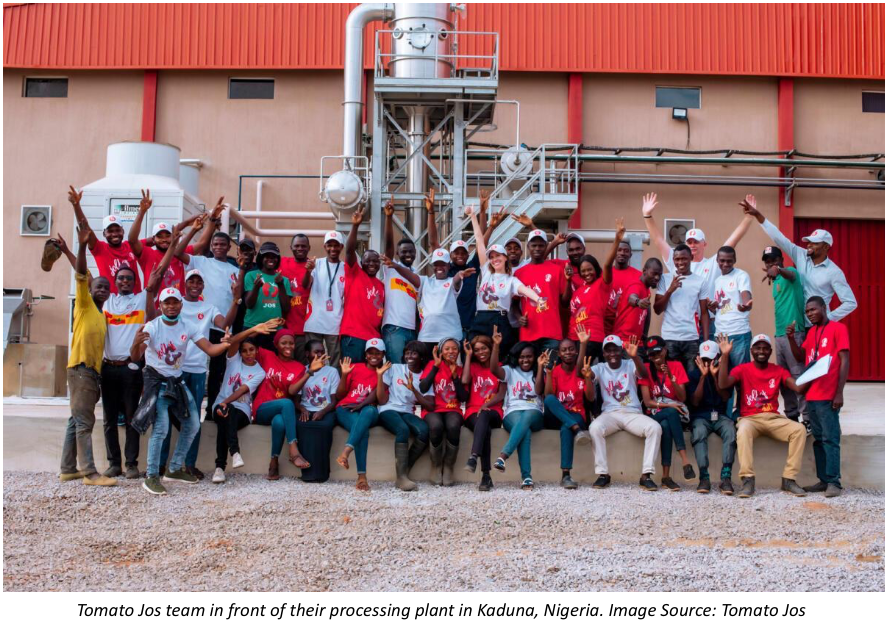
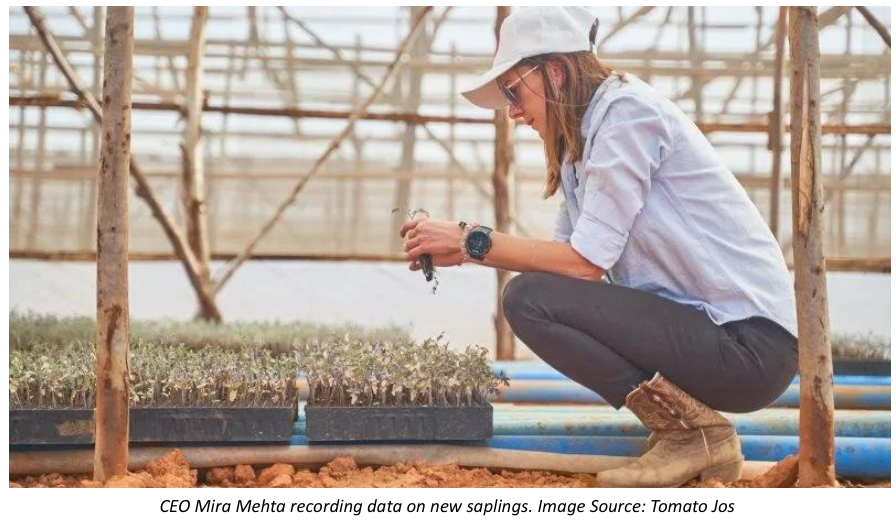
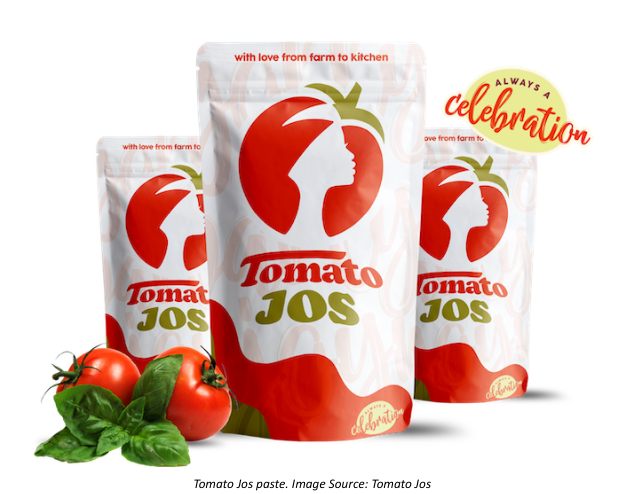
トマト・ジョス – https://tomatojos.net/
Mar 6, 2024
Tomato Jos: Investment & Impact into Nigeria’s Tomato Industry
#impact-investment#sustainable-food-system#social-enterprise#agricultural-sustainability
Abstract
In West Africa, where jollof rice is a staple, the tomato industry faces challenges, particularly in Nigeria, the region’s largest economy. Nigerians rely heavily on tomato paste when cooking, and nearly all of Nigeria’s tomato paste is imported. Escalating demand for tomatoes prompts Nigerian farmers to cultivate them as cash crops, but issues such as storage, transport, and diseases hamper the sector. Despite a yearly harvest exceeding 1.5 million tons, a substantial 40% of fresh tomatoes go to waste, aggravating food insecurity threats. Inflation, oil price volatility, and currency devaluations exacerbate the situation, jeopardizing farmers’ livelihoods. The issues underscore the importance of addressing systemic challenges in the tomato supply chain for enhanced food security in the region.
Founded in 2014 by Mira Mehta, Tomato Jos, a pioneering social enterprise in Nigeria, established a $5 million tomato processing factory in January 2020. Overcoming challenges, the factory rapidly became Nigeria’s third-largest within a year, capable of processing 3.5 tons of fresh tomatoes per hour and producing tomato paste without reliance on imported concentrates. By mid-2022, Tomato Jos had become a 500-hectare enterprise with plans to collaborate with thousands of small-scale farmers on over 2,600 hectares of land. Its products entered the market with a company valuation ranging from $17 million to $26 million USD. Beyond economic productivity, Tomato Jos contributes to a robust tomato value chain, ensures manufacturing throughput, promotes quality local production, and addresses food wastage, thereby addressing food insecurity issues. The company’s vertically integrated model involves training local farmers, fostering community development, and enhancing market access for their processed tomato products, both within Nigeria and potentially beyond. The company, which aims to create a middle class in Northern Nigeria, has resulted in a significant boost in farmer incomes, generating more than $1 million in direct income for the local economy each year and contributing to improved education and housing metrics in the region.

Main Highlights
Problem: Tomato cultivation is widespread across Nigeria, primarily undertaken by smallholder farmers with plots ranging from 0.5 to 4 hectares, representing about 90% of total production, according to FAO statistics. Despite the increasing volume of production, reaching 1.8 metric tons, the country faces significant challenges in meeting the demand for tomatoes, estimated at 2.4 metric tons per annum. Disturbingly, Nigeria experiences a substantial annual loss of 40% in post-harvest tomato stock. This inefficiency contributes to a larger problem—the nation’s struggle with limited access to crucial resources like finance, services, machinery, mentorship, and education. These challenges collectively result in a staggering 72% of smallholder farmers living below the poverty line of $1.90 a day. The overarching consequence of insufficient harvests, compounded by farmer impoverishment and food insecurity, underscores Nigeria’s heavy reliance on foreign agricultural imports.
Context: In Nigeria, a country with the world’s fastest growing population and largest youth population, approximately 70% of its inhabitants are under 30, facing a youth unemployment rate of nearly 19.61 percent. Despite being the second-largest tomato producer in Africa and ranking 14th globally, Nigeria paradoxically stands as the 13th largest importer of tomato paste worldwide. The demand for tomato paste, estimated at 200,000 tonnes with an anticipated annual growth of 10 to 15 percent, is fueled by Nigeria’s vast and steadily increasing population, projected to reach 170 million and grow by 2.5 percent annually over the next five years, according to FMARD.
Solution: Founded in 2014 by Mira Mehta, Tomato Jos, a trailblazing social enterprise in Nigeria, successfully established a $5 million tomato processing factory in January 2020. Overcoming challenges, the factory swiftly ascended to become Nigeria’s third-largest within a year, boasting the capacity to process an impressive 3.5 tons of fresh tomatoes per hour. Notably, it produces tomato paste without reliance on imported concentrates. By mid-2022, Tomato Jos expanded into a 500-hectare enterprise, with ambitious plans to collaborate with thousands of small-scale farmers on over 2,600 hectares of land. Its market entry was marked by a company valuation ranging from $17 million to $26 million USD. In addition to employing over 200 full-time and contract workers, the company has a network of over 3,000 smallholder farmers who work with them year-round to produce yields that are considerably above the national average.
Impact Statement: Beyond bolstering economic productivity and local wealth creation, Tomato Jos plays a pivotal role in establishing a robust tomato value chain, ensuring manufacturing throughput, advocating for quality local production, and addressing food wastage to combat food insecurity. The company’s vertically integrated model involves training local farmers, fostering community development, and enhancing market access for their processed tomato products, both within Nigeria and potentially beyond. With a mission to create a middle class in Northern Nigeria, Tomato Jos has significantly elevated farmer incomes, generating over $1 million in direct income for the local economy each year. Furthermore, the company’s impact extends to contributing to improved education and housing metrics in the region.
Systems Perspective: As Tomato Jos charts its course forward, it faces formidable challenges, including intense market competition, the need to shift consumer behavior, and risks associated with supply chain disruptions. Navigating these complexities while maintaining a positive social impact, ensuring financial sustainability, and embracing technological advancements will be pivotal for Tomato Jos as it continues to shape the future of Nigeria’s tomato industry.
Case Overview
Tomatoes hold a central place in the diverse diets of millions across Africa, featuring prominently in various dishes such as soups, stews, and sauces. Nigeria, with its significant role in West Africa’s culinary scene, notably in the fervently contested “jollof wars,” extends its influence to challenges and opportunities within its tomato industry. Nigerians heavily rely on tomato paste in their cooking, and historically, nearly all of Nigeria’s tomato paste was imported. From 1971 to 2020, Africa experienced substantial growth in tomato production, soaring from 3.29 million to 22.2 million tonnes.
As the largest country in Africa by both economy and population, Nigeria leads sub-Saharan Africa as the second largest producer of tomatoes, accounting for 10.8% of the region’s fresh tomato production in 2019. Over the past decade, Nigeria’s fresh tomato production has surged by 25%, reaching an estimated 2.3 million tonnes. Despite being the 14th largest global producer of tomatoes and the second in Africa, Nigeria paradoxically ranks as the 13th largest importer of tomato paste worldwide and the third in Africa.
Astonishingly, Nigeria allocates up to $500 million annually for tomato imports, including purees, pastes, and canned tomatoes. Responding to increasing demand, Nigeria, as the largest economy in West Africa, cultivates tomatoes as cash crops, particularly in the northern region. Between 40 to 50% of the harvested tomatoes, exceeding 1.5 million tons, in Nigeria never reach the market, contributing to significant post-harvest losses.
Challenges such as storage limitations, transport infrastructure deficiencies, and diseases affect tomato availability and crop yield. Poor infrastructural support for the agricultural sector jeopardizes the work of 70% of Nigerian farmers who own small-scale farms, lacking means to secure markets for their produce. The historical reliance on imports, coupled with rising inflation, oil price volatility, and currency devaluations, exacerbates threats to food security and farmers’ income in Nigeria.

Tomato Jos, A Nigerian Tomato-Farming Business
Amidst these challenges, a transformative initiative unfolded in Kangimi village, Kaduna state, in Northern Nigeria. Founded in 2014 by Mira Mehta, Tomato Jos is a social enterprise based in Nigeria that focuses on tomato farming and processing. The company aims to address challenges in the Nigerian tomato industry–including issues related to storage, transportation, and processing– by establishing a vertically integrated business model that involves every stage of the tomato supply chain.
In 2020, Tomato Jos established a $5 million tomato processing factory. This project, initiated weeks before the global pandemic, became Nigeria’s third-largest tomato factory by January 2021, boasting a processing capacity of 3.5 tons of fresh tomatoes per hour. Notably, it stands as the country’s sole factory producing tomato paste without imported concentrates. By mid-2022, the factory’s products had already penetrated the market, marking a significant milestone.
Tomato Jos’ strategic approach to its business operations involves not only processing but also the development of local tomato production to de-risk the upstream side of the business. Preceding the factory’s construction, the company worked closely with local farmers for five years, providing training, technology, and farming inputs. The agri company’s success largely lies in this phased approach, prioritizing upstream development by focusing on developing the best farming practices in the region before investing in manufacturing. This strategy ensures a sustainable raw material pipeline, minimizes supply risks, and establishes robust infrastructures for distribution, incorporating digital technology and sustainable energy practices. The factory maintains a capacity utilization rate above 80% to avoid a surge in the cost per tonne of production, thereby ensuring profitability in the production of the finished product.
The company’s strategic approach involves a deep understanding of the local context, differentiating Tomato Jos from other players in the industry. Recognizing the importance of aligning global trends with local realities, the CEO emphasizes the need to adapt systems to Nigeria’s infrastructure constraints.
This foundational work resulted in improved tomato quality, increased yields, and enhanced income for farmers, contributing to the strengthening of the entire tomato value chain. Since it was founded in 2014, the company says it has directly supported farmers in growing their average yield by over 340% from 5 to 22 metric tons per hectare, while increasing average income 455%. In addition to employing over 200 full-time and contract workers, the company has a network of over 3,000 smallholder farmers who work with them year-round to produce yields that are considerably above the national average.
The implications of Tomato Jos’ factory operations extend beyond economic productivity. The venture addresses challenges in local tomato production, fosters wealth creation in rural communities, secures manufacturing throughput for tomato paste, and mitigates the issue of food wastage, thereby combating food insecurity. Tomato Jos has made a transformative impact on hundreds of individuals’ lives, enabling progress, education, and entrepreneurship in one of Africa’s poorest regions.
Impact Investment
In its Series A funding round, Tomato Jos successfully secured US$4.4 million in investment. The round was led by Goodwell Investments, in collaboration with its Nigeria-based partner Alitheia Capital, and saw additional contributions from American investors Acumen Capital Partners and VestedWorld. Swiftly deploying the raised capital, Tomato Jos initiated the purchase of processing equipment and commenced the construction of a factory. With the operationalization of the factory, the company anticipates a growth in its full-time staff from 50 to approximately 70 employees. Moreover, Tomato Jos envisions future collaboration with thousands of out-grower farmers, injecting over US$1 million into the local economy annually through increased income opportunities for farmers.
This demonstrates that even a relatively modest agreement can serve as a catalyst, paving the way for increased private capital flows into developing markets over time. These capital inflows are crucial because there exists a substantial funding gap between the resources required to address the world’s most significant development challenges and the combined budgets of international development agencies and donors worldwide. Recognizing the limitations of these organizations to single-handedly close this gap, the prevailing wisdom is that they must attract funding from the private sector’s substantial capital reservoirs to enhance the well-being of people globally.
These investors bring more than just financial resources; they demand stringent standards and financial sustainability. Moreover, once they invest in a social enterprise, investors are strongly motivated to ensure its success. In the grand scheme, such investments contribute to the deepening of local markets, the enhancement of local capacity, and the fostering of self-reliance in countries. These outcomes, in turn, render the efforts of international development agencies more sustainable given their constrained budgets.
In its support for Tomato Jos, USAID is actively furthering the objectives of Prosper Africa, directing millions of dollars in private capital to Northern Nigeria, one of the world’s most impoverished regions. This support aids a company that not only cultivates sweeter tomatoes but also generates employment, elevates incomes, enhances food security, improves education accessibility, and empowers women.
Overall, Tomato Jos serves as a case study in navigating challenges, seizing new market opportunities, and implementing innovative infrastructure solutions in the dynamic landscape of tomato processing in Nigeria.
Impact Statement
The untapped potential in Africa’s agriculture sector is substantial, constituting nearly a quarter of the region’s GDP and supporting the livelihoods of two-thirds of its population. Despite having a significant portion of the world’s uncultivated arable land, Africa faces challenges due to inefficiencies and weak value chains in agriculture. Small-scale farmers, lacking access to modern equipment and techniques, dominate the sector.
Tomato Jos has emerged as a key player in transforming Northern Nigeria’s agricultural landscape and addressing these challenges. Beyond tomato processing, it represents a catalyst for economic empowerment and sustainable development. The company’s integrated approach in maize, soy, and tomato processing has significantly increased yields and shifted subsistence farmers into commercial producers. This has translated into a substantial income boost, with farmers experiencing a five to sixfold increase.
Tomato Jos isn’t just an economic force; it’s a driver of social change. By focusing on best agricultural practices, innovative model farms, and out-grower programs, the company has improved education and housing metrics in the region. Farmers, once facing poverty, are now investing in businesses and expanding their farms, contributing to the formation of a local middle class.
In addition to its local impact, Tomato Jos exemplifies successful public-private collaboration. Supported by USAID and aligned with the Prosper Africa Initiative, the company received crucial funding in its Series A round, signaling global recognition of its mission. As the third-largest tomato processing facility in Nigeria, Tomato Jos stands as a model for ethical business practices, emphasizing local sourcing, community development, and environmental sustainability.
Tomato Jos addresses several United Nations Sustainable Development Goals (SDGs), including:
SDG 1: No Poverty: Tomato Jos empowers smallholder farmers, lifting them out of poverty by providing them with opportunities for increased income and improved livelihoods.
SDG 2: Zero Hunger: By enhancing agricultural practices, improving yields, and reducing post-harvest losses, Tomato Jos contributes to food security and supports efforts to eliminate hunger.
SDG 5: Gender Equality: The company’s initiatives include working with female farmers, promoting gender-inclusive practices, and contributing to the empowerment of women in the agricultural sector.
SDG 8: Decent Work and Economic Growth: Tomato Jos creates job opportunities, particularly in rural areas, fostering economic growth and contributing to the development of a local middle class.
SDG 9: Industry, Innovation, and Infrastructure: The establishment of Tomato Jos as a fully integrated processing business represents an innovative model in the agricultural sector, contributing to industry growth and infrastructure development.
SDG 10: Reduced Inequalities: Tomato Jos’ efforts to work with a diverse range of farmers, including smallholders and female farmers, contribute to reducing inequalities within the agricultural value chain.
SDG 12: Responsible Consumption and Production: Tomato Jos promotes sustainable agricultural practices, including responsible production, reducing waste, and ensuring the efficient use of resources.
SDG 13: Climate Action: The company’s commitment to sustainable agriculture aligns with climate action goals by promoting environmentally friendly farming practices.
SDG 17: Partnerships for the Goals: Tomato Jos’ collaboration with USAID, private investors, and local communities exemplifies the importance of partnerships in achieving sustainable development objectives.
Systems Perspective
Tomato Jos, while achieving commendable success, faces several challenges and considerations as it charts its course forward. In the highly competitive market of tomato paste, dominated by multinational corporations with significant advertising budgets, sustaining market share and achieving continued growth poses an ongoing challenge. The company’s target demographic, focusing on younger consumers, aims to gradually shift brand preferences, but changing consumer behavior, especially among the older generation loyal to established brands, remains a gradual process.
The success of Tomato Jos is intricately linked to the reliability and quality of its tomato supply chain. Any disruptions, such as weather-related issues or diseases affecting crops, could impact production and profitability. Efficient and widespread distribution channels are paramount in Nigeria’s market, requiring strategic partnerships and logistical efficiency. The company’s dependency on external funding, despite successful funding rounds and USAID support, necessitates a focus on financial sustainability and exploring avenues for self-reliance.
External factors like economic fluctuations, regulatory changes, and currency devaluations in Nigeria can significantly impact the business environment. Adapting to these external factors is essential for long-term stability. Additionally, challenges related to infrastructure and logistics in the Nigerian agricultural sector need to be addressed to ensure the timely and efficient transport of tomatoes from farms to processing facilities, minimizing post-harvest losses.
While Tomato Jos has engaged in community projects, maintaining a positive social impact requires ongoing efforts. Balancing business goals with community development and ensuring equitable benefits for farmers and local communities is a continuous consideration. Embracing technological advancements in agriculture and processing will be vital for efficiency, productivity, and competitiveness. As the company expands, incorporating sustainable and environmentally friendly practices in farming and processing should be a priority to address long-term ecological concerns.



Tomato Jos – https://tomatojos.net/
***
Humanity is facing four essential survival challenges (4Revs) – or bottlenecks – which we must overcome to enable the continued flourishing of life on Earth: Food, water, resources, and climate change/energy. These four areas will require revolutionary innovation and, at the same time, provide a treasure trove of new opportunities.
4Revs is a unique, co-creative ecosystem
that aims to help humanity solve these four survival challenges in one generation – between 2020-2050.
最新のピックアップ
-
2024年3月8日
Mar 8, 2024
lithium battery; energy transition; recycling; closed loop

-
2024年3月4日
Mar 4, 2024
ネイチャー・ポジティブに資する 投資は、世界全体のわずか 3%に過ぎない
Only 3 per cent of global investments are nature- positive

-
2024年2月3日
Feb 3, 2024
Towards sustainable regenerative food systems

-
2024年1月4日
Jan 4, 2024
Climate adaptation – 150 options for water in agriculture

-
2023年11月20日
Nov 20, 2023
Biomaterials: Opportunities and challenges in designing sustainable products

